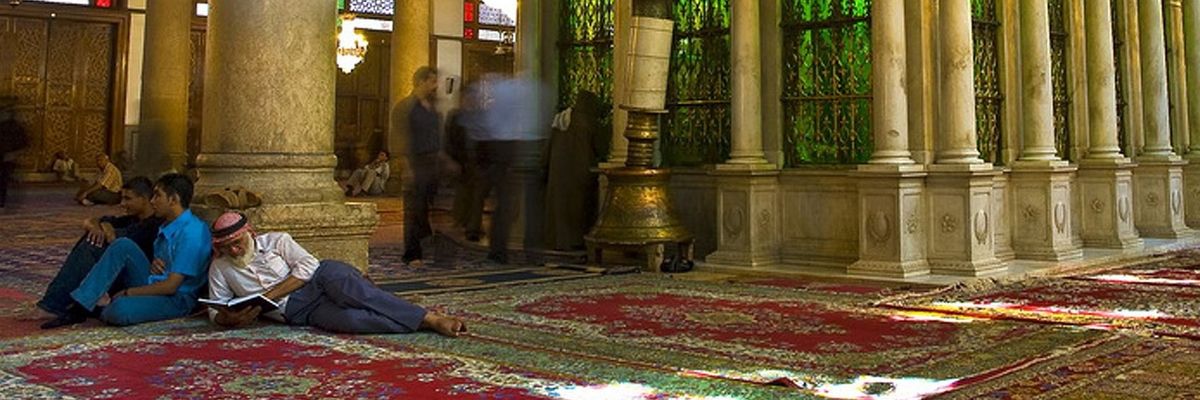The U.S. government’s Arabic-language news channel amplified a conspiracy theory about a Shi’a Muslim foundation so bizarre that even the U.S. State Department disavowed it on Saturday.
The U.S.-funded outlet Alhurra ran a brief web story on Friday about how Iran may be “spreading terrorism” in Europe through the al-Khoe’i Foundation, a London-based Shi’a Muslim institution. Alhurra’s only source was a dubious report by the Israeli think tank Alma, and it did not include a response from al-Khoe’i Foundation.
The U.S. State Department rebuffed the article on Saturday.
“Al-Khoe’i Foundation is a well-regarded international charitable and educational organization that has been doing good work since its establishment in 1989,” the department’s Bureau of Near Eastern Affairs clarified in a Twitter statement.
The foundation was created in 1989 by the Iraqi cleric Ayatollah Abul-Qasim al-Khoe’i, then living in exile. It now represents the Shi’a Muslim community at United Nations consultations, and runs mosques around the world, including the largest Shi’a mosque in New York.
Both al-Khoe’i and his successor, Ayatollah Ali Sistani, have opposed the Iranian model of Shi’a theocracy. Al-Khoe’i’s son, Abdul-Majid al-Khoe’i, was assassinated in 2003 by followers of the anti-American populist Muqtada al-Sadr.
The United States has long tried to court Sistani as an ally in Iraq, as he is well-respected and regarded as a political moderate. Sistani even hosted Pope Francis during the Pontiff’s visit to Iraq earlier this year.
Alma’s report provides no evidence that al-Khoe’i Foundation is actually connected to terrorism, and frequently conflates the Iranian regime’s ideology with Shi’a Islam as a religion. For example, the report complains that al-Khoe’i Foundation “promotes the principles of Shia [sic] around the world,” and is “spreading the Shia [sic] in Europe.”
The report’s main piece of evidence connecting al-Khoe’i Foundation to Iran is spurious: the foundation’s Paris mosque is listed in the Ahlul Bayt Digital Islamic Library, a Michigan-based academic institute whose name sounds similar to an Iranian religious institution called the Ahlul Bayt World Assembly.
However, the two are different organizations, and “Ahlul Bayt” is a common Islamic religious term referring to the family of the Prophet Muhammad.
Al-Khoe’i Foundation later clarified to Alhurra that it has no connection to the Ahlul Bayt World Assembly or the Iranian government.
Alma’s report also claims that al-Khoe’i Foundation helps finance the Houthi rebellion in Yemen. Its evidence is an article claiming that “Iranian Shi’a institutions” in Britain are supporting the Houthis under the guise of humanitarian aid. The article only cites anonymous sources, and first appeared on a website founded by a former Egyptian official to defend Arab regimes like Egypt, the Emirates, and Saudi Arabia.
Alhurra’s decision to promote these claims sent the U.S. government scrambling to control the damage.
The State Department’s Bureau of Near Eastern Affairs issued its statement on Saturday, and Alhurra corrected the story with comments from al-Khoe’i Foundation.
“The writer is either completely unaware of what he writes…or has some motive,” said Sheikh Isma’il al-Khaliq, head preacher at the foundation’s Paris mosque. “Al-Khoe’i Foundation’s approach is to spread Islamic cultural and educational thought, found in the approach of the Prophet and Ahlul Bayt.”
Al-Khaliq added that the foundation’s methods are “cultural and intellectual work, not political work.”
But the damage was already done, as Alhurra’s original story was reprinted on a variety of Arabic-language news websites. And the State Department’s statement prompted the Jerusalem Post to run its own story repeating Alma’s claims.
The U.S. Agency for Global Media, which oversees Alhurra, did not immediately respond to a request for comment.
















